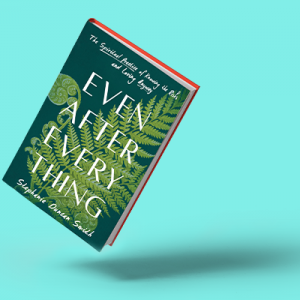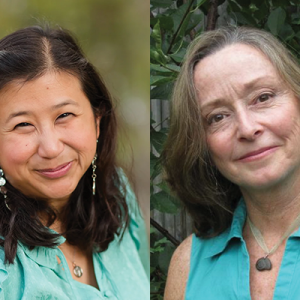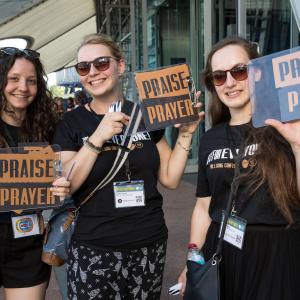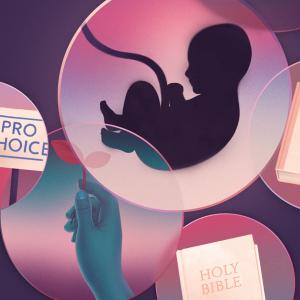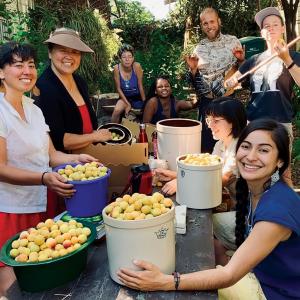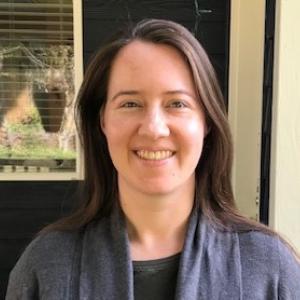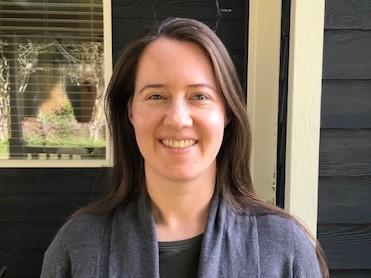
Liz Cooledge Jenkins is the Seattle-based author of Nice Churchy Patriarchy, and she blogs at growingintokinship.substack.com.
Posts By This Author
Slowing Down for Grief
IF YOU WROTE down your past year’s most significant personal joys and losses on a timeline, how might they line up with the liturgical calendar — Advent, Christmas, Epiphany, Lent, Holy Week, Eastertide, and Ordinary Time? Placing these two calendars side by side, what might you find? Stephanie Duncan Smith digs into these questions in her memoir Even After Everything. For Duncan Smith — and likely for most of us — “Sometimes our personal moments converge with these natural and sacred seasons in profound, meaning-rich ways. And sometimes they clash with unbearable disparity.”
Duncan Smith shares her own story of loss and love with unflinching honesty, even and especially where it seems to clash with the Christian story. The places of dissonance are, for her, both a “dizzying problem” and a “place of divine encounter.” She invites us to dive into the dissonance with her as she wrestles out a sort of reconciliation — a renewed understanding of the Christian story that makes room, so much room, for every human grief. “The promise has never been smooth nor safe passage,” Duncan Smith writes. “The divine promise is presence.”
What Do We Want? Justice! What Have We Got? Burnout!
DORCAS CHENG-TOZUN, author of Social Justice for the Sensitive Soul (Broadleaf), wanted to be an “unceasing voice” for social justice. “And while I was busy saving the world,” she writes, “I would also be the kind of person who’d happily sacrifice anything for a good cause.” But 10 months after Cheng-Tozun moved from the U.S. to China to set up an operations office for her spouse’s solar business, thrilled at the possibility of providing affordable electricity to billions of people, she experienced the “worst and longest panic attack” of her life. For more than a year, she could do “little more than sleep and cry and journal.” A crucial, difficult question arose: “Why can’t I handle what everyone else seems to be managing perfectly well?”
For Trish O’Kane, author of Birding to Change the World (Ecco), the breaking point was Hurricane Katrina, which destroyed her New Orleans home and neighborhood. “After a disaster,” O’Kane reflects, “you just can’t do as much. Nor should you. You need time to think, to ponder ... I needed a great slowing down.” She took up knitting, spent long hours outdoors on the ground “watching the clouds change shape and bumblebees loading their back legs with pollen and the yard birds going about their business.
Like Cheng-Tozun’s year of sleeping, crying, and journaling, these months surfaced life-changing questions for O’Kane. “I could feel my question changing,” O’Kane writes, “from What should I do? to How should I be?”
In their respective books, Cheng-Tozun and O’Kane write from the other side of activist burnout — something Cheng-Tozun experienced after working for multiple social justice organizations, and O’Kane after working in human rights journalism in conflict areas, both for many years. Both writers ponder how to change, heal, and move forward. Birdwatching was the gateway for O’Kane, while Cheng-Tozun found herself reflecting on sensitivity, introversion, and the many ways people are wired with different gifts to offer. They have different backgrounds and stories — Cheng-Tozun is now a writer and consultant who most recently worked for a Christian nonprofit that equips BIPOC contemplative activists; O’Kane is an environmental educator who created the “Birding to Change the World” program at University of Wisconsin-Madison — but both authors offer a similar invitation to those who yearn to make a difference: Learn to embody gentler, more sustainable ways of doing so.
Churches Can Utilize Volunteers Without Exploiting Free Labor
The Secrets of Hillsong, a docuseries streaming on Hulu, traverses some wide-ranging — and alarming — ground, detailing the international megachurch’s history of sexual assault allegations, affairs, child molestation, and cover-ups. In the midst of all this, it might be easy to gloss over something a little less flashy: what one might call, to put it mildly, an unhealthy volunteer culture.
When It Comes to the Climate Crisis, What Comes After Lament?
Elizabeth Weinberg draws connections between things many of us haven’t thought to link together. In her 2022 book, Unsettling: Surviving Extinction Together, a whale’s excrement is not just feces but the nourishment that fuels whole ecosystems.
Who Are Christians Called To Be in a Post-Roe World?
THE REPRODUCTIVE HEALTH landscape in the United States has changed drastically in the last year, and it continues to change. But some things remain the same. One consistent aspect of our ongoing national conversation is that many of those who support the greatest restrictions, including on access to abortion and other elements of reproductive health, claim Christian faith as a primary motivator.
I spent much of my young adulthood in evangelical contexts where people had strong opinions about faith and reproductive rights. Most evangelicals I knew believed that life begins at conception and thus abortion should be broadly prohibited by the law as akin to murder. In these spaces, the Bible was considered the main — sometimes the only — source of authority when it came to navigating ethical questions. I’ve come to realize, though, that the Bible hardly speaks anything straightforward into the intensely personal realm of when human life begins and what decisions should be made in complicated, real-world situations.
I wonder, then: What does it look like to wade through this murky territory as people of faith? Who are Christians called to be in a post-Roe world?
Healing Grounds for the Earth — and for Christianity
WHEN I SPEAK on the phone with Anne Symens-Bucher, she tells me about the end of St. Francis of Assisi’s life. Francis “was losing sight, suffering from the pain of the stigmata, and on the margins of the community that had grown up to follow him,” Symens-Bucher explains. “This is the moment he writes the ‘Canticle of Creation.’” Symens-Bucher is one of the founders of Canticle Farm in Oakland, Calif., a community of eight households where the fences are taken down, giving access to a large garden in the middle. Canticle Farm is made up of people who, in Symens-Bucher’s words, are “experimenting at the intersections of faith-based, social justice-based, and Earth-based nonviolent activism.” In his canticle, after which this community is named, Francis praises God from a deep sense of kinship with all creation. He sings of “brother fire,” “sister water,” “brother wind,” “mother earth.” Birthed as Francis approaches his own death, it is a vivid, sober-minded song of the interconnectedness of all life.
Western colonialist people have often failed — or refused — to recognize this interconnectedness. Earth, animals, plants, and people suffer from our (and I say “our” because I speak as a white U.S. citizen) denial of this oneness. Soils are depleted, waters and air are poisoned, and sea levels rise and temperatures warm, threatening the most vulnerable among us immediately, and all of us eventually. Perhaps in this time of environmental crisis, we might find a “canticle” moment, one that renews our kinship with creation.
Liz Carlisle explores these questions in Healing Grounds: Climate, Justice, and the Deep Roots of Regenerative Farming. As an environmental scientist looking for healthy soil, Carlisle interviews experts who are Black, Indigenous, and people of color — scientists and farmers engaged in work ranging from bringing buffalo back to the prairie ecosystems of Montana to growing mushrooms on ancestral forest land in North Carolina. Through the process, she realizes that if we’re serious about fighting climate change by rebuilding soil carbon, we’re going to have to address the very roots of the colonialist systems in which we live.
Praying the Imprecatory Psalms Is an Act of Nonviolence
As Hebrew Bible scholar Walter Brueggemann has reflected, the imprecatory psalms put words to our thirst for vengeance. In praying these psalms, we process our rage and give our violent impulses over to God. “O God, break the teeth in their mouths,” one psalmist prays; “let them be like the snail that dissolves into slime” (Psalm 58:6, 8). I’m all for this kind of prayer. I’m all for praying the entire range of the psalms — even the ones that sometimes make us uncomfortable or aren’t necessarily welcome in church. And if there is any occasion for an imprecatory psalm, certainly Russia’s invasion of Ukraine, in all of its brutality and sheer horror, is one of those occasions.
Extraordinary Courage, Extraordinary Kindness
“Boaz goes out of his way, above and beyond what might have been normal or expected, to use his relative wealth, and security, and power to affirm Ruth’s dignity and value. He did this in the midst of a world that, not unlike ours today, did not always value people who were poor, or immigrants, or of a minority race, or ethnicity, or women.”
